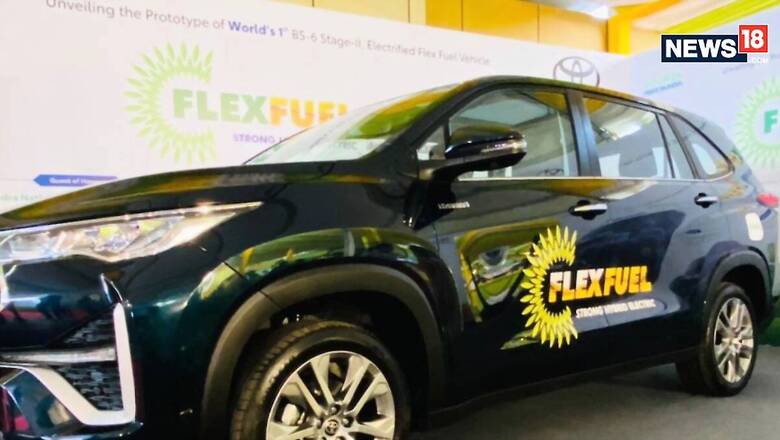
views
Toyota Kirloskar Motor (TKM) has unveiled the world’s first electrified flex-fuel vehicle prototype.
Drawing inspiration from the revered Innova HyCross MPV, this automotive gem boasts a remarkable synergy of a 2.0-litre Atkinson Cycle petrol engine harmoniously intertwined with a hybrid-electric powertrain.
Dubbed as the “Innova HyCross Flex-Fuel Prototype,” this prototype adheres skillfuly to the BS-VI Phase-II norms. Furthermore, a distinguishing quality of this prototype is its unrivalled capacity to run on fuel combined with an ethanol percentage that soars above 20 percent. This achievement moves us closer to a greener future in a country where environmental awareness and creativity go hand in hand.
By August 2023, the breakthrough E20 fuel had been adopted by more than 1,900 petrol stations throughout India. By 2025–2026, the entire country will be ready to adopt E20 compliance. This kind of change has economic as well as ecological implications. According to the prediction, India’s crude oil import costs might be reduced by an astounding Rs 30,000 crore as a result of the switch to fuel blended with ethanol. This is no small accomplishment for a country that now spends Rs 16 lakh crore on the import of crude oil to cover its energy needs.
Imagine a vehicle that not only embraces the electric powertrain revolution but also embraces the potential of ethanol. Electrified flex-fuel vehicles seamlessly merge these two realms, offering potent advantages—both in fuel savings and in cultivating an electric vehicle ecosystem. The marriage of convenience and sustainability is more than a vision; it’s the trajectory India is charting.
The Innova HyCross flex-fuel prototype marks a paradigm shift in precision engineering. While displaying the lowest well-to-wheel emissions, it smoothly transitions from an EV mode for 60 percent of its journey to an ethanol-powered engine for the final 40 percent. TKM’s pursuit of excellence is reflected in this complex tango between power sources.
TKM engineers strengthened the HyCross prototype with a motor-driven VVT system to ensure exceptional cold-start performance even in below-freezing conditions, adapting to India’s complex meteorological pattern. The three-way catalyst in the exhaust system, which removes hydrocarbon pollutants, was created as a result of the unwavering dedication to emissions regulations.
India is currently the third-largest carbon emitter in the world, so the introduction of this prototype represents more than just automotive innovation. It also represents a dedication to a sustainable growth strategy. The need of alternative fuels like bio-ethanol is emphasised by Vikram Gulati, the Country Head of TKM. They not only support environmentally friendly energy sources but also revitalise the agrarian economy, reducing India’s dependency on crude oil imports in the process.
Vikram Gulati echoes the sentiment, “This milestone demonstrates our commitment to provide advanced technology solutions for our customers.” In the labyrinth of innovation and sustainability, TKM has emerged as a guiding light, steering us toward a future that’s not just automotive—it’s aspirational.
Besides this, Gulati wholeheartedly supports the roadmap’s aim of carbon neutrality by 2070, which calls for flex-fuel vehicles to be an integral component of India’s energy security by 2047.




















Comments
0 comment